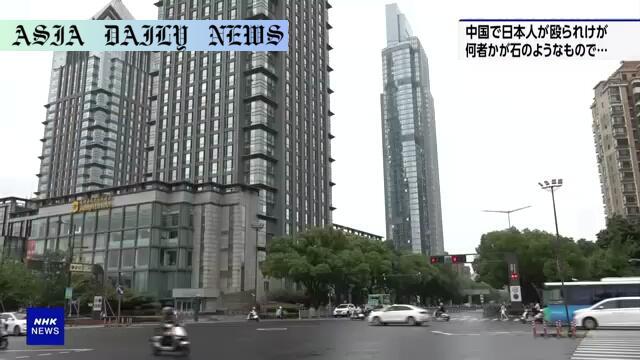Japanese National Attack – A Japanese national was reportedly attacked with a stone-like object in Suzhou, China, and is now safe.
Japanese national attacked in Suzhou, China.
Suspect detained by local police.
Japanese government calls for increased safety measures.
Japanese Chamber of Commerce expresses deep concern.

An Unfortunate Attack in Suzhou
In a distressing incident that has raised international concern, a Japanese national was attacked in Suzhou, located in eastern China’s Jiangsu province. The attack reportedly took place in a local subway station where a Japanese mother and her child were targeted by a male assailant wielding a stone-like object. Fortunately, the injury sustained by the victim was not life-threatening, and after receiving treatment in a nearby hospital, she was discharged and has since returned home.
The attack has reignited apprehensions among Japanese nationals in China regarding their personal safety, particularly as incidents targeting Japanese citizens come under increased scrutiny. While the suspect fled the scene, local police authorities acted swiftly and have confirmed the detention of the individual involved in the attack. While no further details about the suspect or their motives have been disclosed, this event underscores the need for continuous vigilance and safety for foreign nationals residing in or visiting China.
Historical Context Impacting Present-Day Relations
The timing of this incident is significant, as it comes during the 80th anniversary of China’s World War Two victory over Japan. This commemoration has stirred anti-Japanese sentiment among portions of the population. Along with numerous public events, including the screening of related movies and an impending military parade, the historical tensions between the two nations appear to have added fuel to the sensitive nature of bilateral relations.
This attack also recalls the tragic incident from June of the previous year when a Japanese school bus in Suzhou was ambushed. That attack claimed the life of a Chinese bus attendant and left a Japanese mother and her child injured. Such repeated events bring to light the challenges faced by Japan-China relations and the need to address these security concerns methodically.
Calls for Proactive Safety Measures
In response to the incident, the Japanese government has formally urged the Chinese authorities to adopt comprehensive measures to guarantee the safety of Japanese nationals. While the Japanese Consulate General in Shanghai continues to monitor the situation closely, it has stressed the critical importance of ensuring that all incidents involving foreign nationals are promptly investigated, with the perpetrators brought to justice. Additionally, the Japanese Chamber of Commerce and Industry in China has issued a formal statement expressing its deep regret and concern over the recurring nature of such incidents, which threaten the assurance of security needed for Japanese companies operating within China.
The Chamber’s statement emphasizes the importance of both the Japanese and Chinese governments addressing these concerns proactively, ensuring that the safety of Japanese employees and their families is prioritized. Moreover, the absence of transparent details regarding the events perpetuates an atmosphere of anxiety among both Japanese citizens and expatriates living in China.
The Broader Impact on Diplomatic Relations
While isolated incidents of violence cannot define the entirety of Japan-China relations, their recurring frequency threatens to strain diplomatic ties. Given the economic and geopolitical significance of their relationship, building mutual trust and respect is paramount for fostering healthy cooperation between the two nations. At a time when global unrest already plagues many regions, both governments should work toward collaborative initiatives intended to mitigate tensions and promote better cross-cultural understanding between their respective populations.
To avoid escalating hostilities, it is essential that these violent attacks are not treated as isolated occurrences but rather as opportunities for both nations to engage in long-lasting dialogue. By addressing incidents such as this directly and establishing firm bilateral frameworks for security and conflict resolution, tangible progress can be made in ensuring the well-being of all citizens who live and work abroad.
In conclusion, the attack on a Japanese mother and her child in Suzhou reflects broader challenges that must be tackled with empathy, understanding, and commitment to safety by all involved parties.



Commentary
Reflection on the Ongoing Safety Concerns
As we reflect on the recent attack in Suzhou, it brings to light the perpetual vulnerabilities faced by expatriates worldwide, including Japanese nationals residing in China. This particular event not only underscores the fragility of individual safety but also reaffirms the significance of cultivating safe, inclusive, and tolerant environments across borders. The fact that such incidents continue to occur suggests a pressing need for more assertive diplomatic and local solutions.
The Role of Historical Tensions
One cannot ignore the shadow cast by history in incidents like this. The relationship between Japan and China has long been complicated by historical grievances stemming from World War Two. In commemorating such milestones, it is crucial to ensure that the recognition of historical victories does not inadvertently fan the flames of hostility. Governments must actively discourage discriminatory narratives if they wish to strengthen cross-national friendships rather than exacerbate old wounds.
Community and Diplomatic Engagement
Lastly, we must look to community initiatives and diplomacy as key tools in addressing these challenges. In addition to enforcing stricter safety protocols, both nations should encourage open dialogue and community-building measures. These initiatives could take the form of cultural exchange programs, bilateral seminars, and other avenues designed to foster mutual respect and understanding. Such actions would not only address the immediate safety concerns but also pave the way for long-term improvement in bilateral relations.
Ultimately, incidents like the attack in Suzhou serve as stark reminders of the work yet to be done in fostering safer, more harmonious global communities.